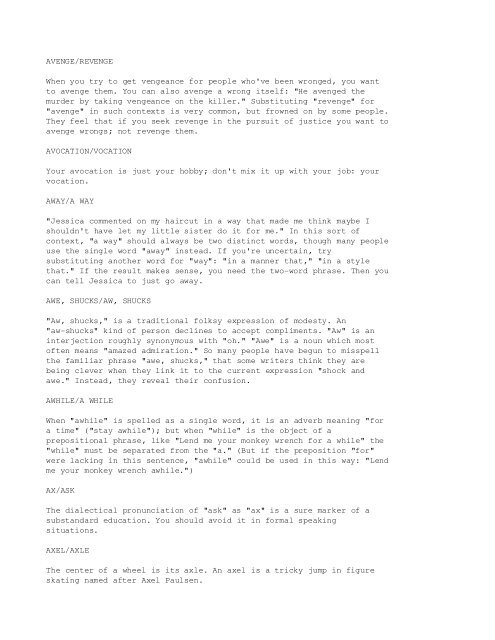Common_Errors_in_English_usage
Common_Errors_in_English_usage
Common_Errors_in_English_usage
Create successful ePaper yourself
Turn your PDF publications into a flip-book with our unique Google optimized e-Paper software.
AVENGE/REVENGE<br />
When you try to get vengeance for people who've been wronged, you want<br />
to avenge them. You can also avenge a wrong itself: "He avenged the<br />
murder by tak<strong>in</strong>g vengeance on the killer." Substitut<strong>in</strong>g "revenge" for<br />
"avenge" <strong>in</strong> such contexts is very common, but frowned on by some people.<br />
They feel that if you seek revenge <strong>in</strong> the pursuit of justice you want to<br />
avenge wrongs; not revenge them.<br />
AVOCATION/VOCATION<br />
Your avocation is just your hobby; don't mix it up with your job: your<br />
vocation.<br />
AWAY/A WAY<br />
"Jessica commented on my haircut <strong>in</strong> a way that made me th<strong>in</strong>k maybe I<br />
shouldn't have let my little sister do it for me." In this sort of<br />
context, "a way" should always be two dist<strong>in</strong>ct words, though many people<br />
use the s<strong>in</strong>gle word "away" <strong>in</strong>stead. If you're uncerta<strong>in</strong>, try<br />
substitut<strong>in</strong>g another word for "way": "<strong>in</strong> a manner that," "<strong>in</strong> a style<br />
that." If the result makes sense, you need the twoword phrase. Then you<br />
can tell Jessica to just go away.<br />
AWE, SHUCKS/AW, SHUCKS<br />
"Aw, shucks," is a traditional folksy expression of modesty. An<br />
"awshucks" k<strong>in</strong>d of person decl<strong>in</strong>es to accept compliments. "Aw" is an<br />
<strong>in</strong>terjection roughly synonymous with "oh." "Awe" is a noun which most<br />
often means "amazed admiration." So many people have begun to misspell<br />
the familiar phrase "awe, shucks," that some writers th<strong>in</strong>k they are<br />
be<strong>in</strong>g clever when they l<strong>in</strong>k it to the current expression "shock and<br />
awe." Instead, they reveal their confusion.<br />
AWHILE/A WHILE<br />
When "awhile" is spelled as a s<strong>in</strong>gle word, it is an adverb mean<strong>in</strong>g "for<br />
a time" ("stay awhile"); but when "while" is the object of a<br />
prepositional phrase, like "Lend me your monkey wrench for a while" the<br />
"while" must be separated from the "a." (But if the preposition "for"<br />
were lack<strong>in</strong>g <strong>in</strong> this sentence, "awhile" could be used <strong>in</strong> this way: "Lend<br />
me your monkey wrench awhile.")<br />
AX/ASK<br />
The dialectical pronunciation of "ask" as "ax" is a sure marker of a<br />
substandard education. You should avoid it <strong>in</strong> formal speak<strong>in</strong>g<br />
situations.<br />
AXEL/AXLE<br />
The center of a wheel is its axle. An axel is a tricky jump <strong>in</strong> figure<br />
skat<strong>in</strong>g named after Axel Paulsen.





